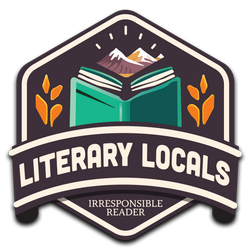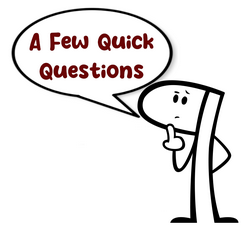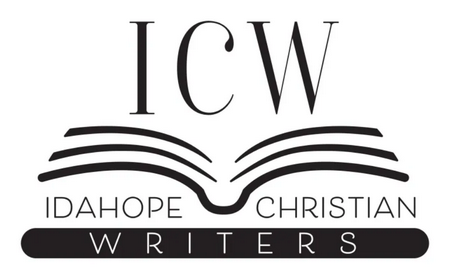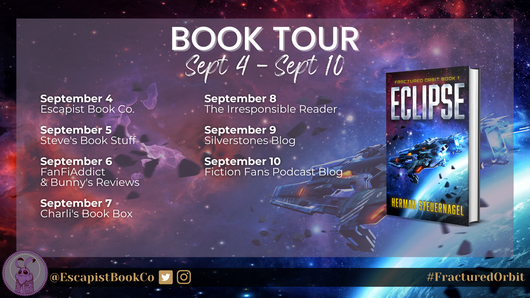
Brock Poulsen is another writer I recently met at the Boise Library!’s Book Faire, I’m very glad he took a few minutes to chat with me then and now. Hope you enjoy this look at writing in Idaho.
Before we get into things, why don’t you give the reader a brief introduction to you and your work.
Hi reader! I’m a genre writer, with stories that run the gamut from fantasy to sci-fi to horror. My main series is called Bizarre Frontier, and it’s my take on a weird western. There’s plenty of magic and lots of monsters, inspired by the folklore of the American west. Five books are out so far, with more on the way! My other stories have appeared in anthologies and online magazines, and I have a collection of short horror stories that was recently released on November 25th.
This seems like a good time to plug the new book—what’s it called, where can people pick it up, etc?
It’s called Gathering Shells and Other Stories, available at godless.com or at Amazon.
What brought you to Idaho in the first place? What is it about Idaho that keeps you here?
I moved to Idaho about 6 years ago, to bring us a little closer to my wife’s family. We’d always enjoyed our visits before moving here, and we stay because it’s beautiful, and the food and people are wonderful!
I think you might be the first to mention the food in relation to this question. I’m tempted to ask several follow-ups about that, but this isn’t that kind of blog. But you’ve got me wondering where you like to tie the feed-bag on (note how cleverly I adopt a Western figure of speech while talking to a Weird Western writer).
Oh, one of my favorite topics! Thai Basil in Meridian is a favorite. If it were financially and physiologically viable, I would replace all the liquids in my life with their yellow curry. It is a triumph of flavor.
I also love getting banh mi from the Baguette Deli, and have eaten an absurd number of tacos from Fiesta Chicken. I’m sure I could go on, but writers aren’t really known for being overly verbose, right?
🙂 Thai Basil has been on our “we should try that” list for a while. I think their yellow curry is in my near-future. Thanks!
Are you tied into some sort of local author/bookish group/culture? If so, tell us about it and how it helps you as an author.
I’m a proud member of the Idaho Writer’s Guild, and I love attending their events. I’ve met several good friends there, and I love getting together and inspiring each other. They host great events with fantastic guests, and I think they’ve helped me become a better writer.
Not surprisingly, you’re not the first to mention IWG. What kind of events do they hold. What are some of the ways they’ve helped you become that better writer? In short, I guess, why should someone in the area check them out?
Writing can feel very lonely, and the social aspects of the IWG are great for counteracting that at least a little bit. Being around other writers is great for working out wrinkles in your story, talking about the craft and logistics, and generally encouraging each other to stick with it. They’ve also had more structured meetups where successful writers have come to talk about some of the more technical and business aspects of being an indie writer. They have helped me get a better grasp on things like advertising and building an audience.
What kind of events in the area do you attend—either to sell/promote your books or to network with authors? Are there any outside of this area that you hit regularly and wish we had something like it here?
I’ve been attending a Creative Writing group at the Cole and Ustick library, which has been awesome for meeting other motivated writers. I’m trying to do more promotion and selling at local events, including the recent Boise Book Faire and the upcoming Krampus Con.
Did the Library’s Faire live up to your expectations? That is, if you had any. Did you learn (from your experience or talking to others) what to do more of or not to do at your next event? In general, what was your experience like? Have you attended Krampus Con (either as an author or just an attendee)–what’s it like? I’ve often wondered, but haven’t fit it into my schedule.
I really wasn’t sure what to expect at the Book Faire, but I loved hanging out with other indies from around the valley. One of my favorite parts was when I had a pretty in-depth conversation about my book series with a nine-year-old girl. She asked such great questions, and it was an absolute delight. That young lady’s parents should be proud of what a sharp literary mind she’s developed.
The tricky thing about local events–and about selling books in general–is getting my stuff in front of the right audience. The stories I write fit into some specific niches, so it’s about finding the right people, which is a challenge.
What’s the breakdown of your audience—do you have a strong local base, or are your readers from other parts of the world?
I have readers spread out all over the world, mostly in the United States, but I’ve sold books to people in Europe as well. I’d love to connect with more local readers, because those in-person connections are amazing. Talking about stories with passionate readers is a thrilling, life-affirming experience, and I love it.
Do you think there are particular challenges or advantages to being a writer in the Treasure Valley? (possibly both)
Writing has the advantage of being a very mobile activity. I can do it from essentially anywhere, and people can access my work from all over the world. Treasure Valley is a smaller market than some, but I think the people here are no less excited about reading. Our library system is amazing, also, which is so good for writers and readers alike.
Do you bring Idaho (or some sort of Idaho-sensibility, assuming one exists) to your work? Whether or not anyone else sees it, can you look at some aspect of your writing and think “That’s Idaho” or “I would do ____ differently if I was a Kentuckian or from Illinois?”
do think my weird westerns have, probably unavoidably, a spirit of the American west that exists strongly in Idaho. My characters are brave and adventurous, they don’t back down from challenges, and they care deeply about their fellow human beings. Those are qualities that I love to see Idaho live up to.
One final question, is there a book (or two…or 18, if you get really carried away), that embodies Idaho/the Idaho spirit to you to recommend to my readers?
This doesn’t have a direct Idaho connection, but Six-Gun Snow White by Catherynne M. Valente was an excellent western take on the Snow White story. Another recent favorite was A House with Good Bones by T. Kingfisher, a scarier book about the perils of returning home, and the way our past can reach into our present.
Interesting picks…I like the thinking behind them (I’ve been meaning to check out that Valente for a while, thanks for the reminder)
Thanks for your time and participation! Hope you enjoyed it!
It was a pleasure, thanks for reaching out!
Readers, be sure to check out the work of Brock Poulsen. His Horror and Weird Westerns look like they could scratch a particular itch or two.







